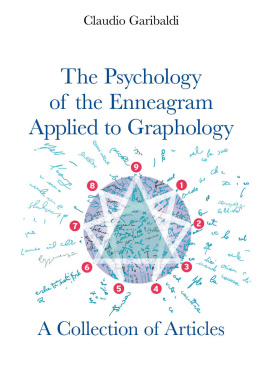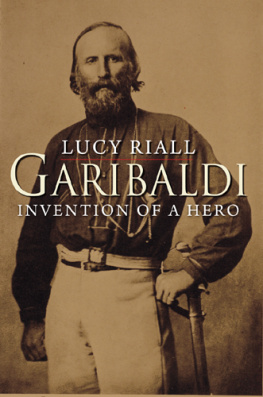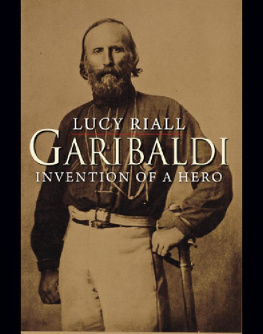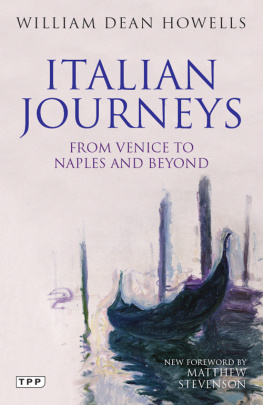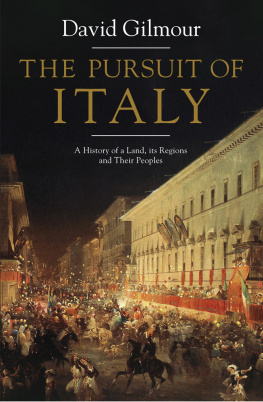G. M. Trevelyan - Garibaldi and the Thousand
Here you can read online G. M. Trevelyan - Garibaldi and the Thousand full text of the book (entire story) in english for free. Download pdf and epub, get meaning, cover and reviews about this ebook. year: 2011, publisher: Barnes & Noble, genre: Science. Description of the work, (preface) as well as reviews are available. Best literature library LitArk.com created for fans of good reading and offers a wide selection of genres:
Romance novel
Science fiction
Adventure
Detective
Science
History
Home and family
Prose
Art
Politics
Computer
Non-fiction
Religion
Business
Children
Humor
Choose a favorite category and find really read worthwhile books. Enjoy immersion in the world of imagination, feel the emotions of the characters or learn something new for yourself, make an fascinating discovery.
- Book:Garibaldi and the Thousand
- Author:
- Publisher:Barnes & Noble
- Genre:
- Year:2011
- Rating:4 / 5
- Favourites:Add to favourites
- Your mark:
- 80
- 1
- 2
- 3
- 4
- 5
Garibaldi and the Thousand: summary, description and annotation
We offer to read an annotation, description, summary or preface (depends on what the author of the book "Garibaldi and the Thousand" wrote himself). If you haven't found the necessary information about the book — write in the comments, we will try to find it.
Published in 1909, this is the second volume in Trevelyans trilogy about Giuseppe Garibaldi (1807-1882), the Italian patriot and revolutionary, which began with Garibaldis Defense of the Roman Republic (1906) and ended in Garibaldi and the Making of Italy (1911). This volume focuses on Garibaldis famous victory over the Neopolitan troops with just his 1,000 ragged rebels.
Garibaldi and the Thousand — read online for free the complete book (whole text) full work
Below is the text of the book, divided by pages. System saving the place of the last page read, allows you to conveniently read the book "Garibaldi and the Thousand" online for free, without having to search again every time where you left off. Put a bookmark, and you can go to the page where you finished reading at any time.
Font size:
Interval:
Bookmark:
G. M. TREVELYAN

This 2011 edition published by Barnes & Noble, Inc.
All rights reserved. No part of this publication may be reproduced, stored in a retrieval system, or transmitted, in any form or by any means, electronic, mechanical, photocopying, recording, or otherwise, without prior written permission from the publisher.
Barnes & Noble, Inc.
122 Fifth Avenue
New York, NY 10011
ISBN: 978-1-4114-5042-4
LIST OF MAPS
For Chap. V.
For Chap. XIII.
INTRODUCTION
W HEN , on New Year's Day 1859, the Emperor Napoleon III startled Europe by a few polite but ominous words spoken to the Austrian ambassador, Italy of the Italians was still confined to the small state of Piedmont, nestling between the Alps and the sea. Strong not in the numbers but in the character of its citizens, it enjoyed the respect of Europe, the sympathy of France and England, and the wistful affection of the inhabitants of the other states of the peninsulasentiments inspired by the well-ordered Parliamentary government of King Victor Emmanuel and his minister Cavour. The rest of Italy, still partitioned among half a dozen different rulers, was exposed to the absolute power of priests, of foreigners, or of native despots, bound together in a close triple alliance against the rights of the laity, personal freedom, and Italian independence. Two years went by, and the aspect of affairs had undergone a change so complete and sudden that many would not believe that it was indeed destined to be permanent. When, in November 1860, Garibaldi resigned the Dictatorship of Sicily and Naples, and sailed back to his farm on Caprera with a large bag of seed-corn and a small handful of lira notes, he left Victor Emmanuel acknowledged as constitutional monarch in all those territories that we now know as the Kingdom of Italywith the exception of two or three fortresses where the Bourbon flag flew for yet a few months longer, of the ancient territories of the Venetian Republic, still guarded by the Austrian Quadrilateral, and of that narrow 'Patrimony' of the earlier Popes, where the herdsmen and vine-dressers could descry the cupola of St. Peter's floating above the evening mist, like the ark of the Church above the tide of revolution. In the winter of 186061 a patriot could have travelled from Brescia to Reggio and Palermo by the whole central chain of the Apennines, without let or hindrance from any anti-national force except an occasional party of brigands in the Neapolitan provinces. If it was not till 1866 that the Austrian colours were lowered from the three great flag-staffs that stand in front of St. Mark's at Venice, if it was not till after the news of Sedan that Italy could wisely dare to enter Rome, nonetheless the creation of the new State was already an accomplished fact when Garibaldi quitted Naples for Caprera.
We may therefore say that in the years 1859 and 1860 the Italians acquired their national independence, their civic freedom and their political union. This profound and permanent change in the European polity was effected contrary to the expectations and wishes of nearly all the rest of Europe, and under the guns of France and Austria, who, differing on so many points as regards the fate of Italy, were at least agreed in objecting to her union under a single ruler. To neither of these powers could she have offered a prolonged military resistance, yet she attained her purpose in their despite.
The rapid series of events that led to results so great, and apparently so improbable, was brought to fruition by the supreme political genius of one Italian, and by the crowning achievement of another, whose name is to the modern world the synonym of simple heroism. The story of Italy in these two years is rich in all the elements whereby history becomes inspiring, instructive and dramatic. In it we read of all the qualities that make us respect or despise mankind; here the heroism and there the cowardice of whole populations; the devotion of individuals and of families, side by side with the basest egoism; the highest wisdom and the wildest folly; the purest patriotism and the meanest jealousy, not always found in opposite factions or even in separate breasts. We watch the play of great personalities; the kaleidoscopic shifting of the diplomatic forces of Europe; bewildering turns of chance, messengers who would have saved a kingdom stopped by the whim of villagers, decisions of peace or war reached a few days too late or a few days too soon to turn the current of destiny, hair-breadth escapes of men and armies on whom all depended; heroism, tragedy and burlesque taking the stage of history together. Finally, we witness the success of the most hazardous enterprises; the fall of kingdoms and principalities: the dismemberment of the most ancient and terrible Theocracy of the western world; the realisation of those hopes for which the martyrs of Italy had suffered and perished for two generations, and a full share of the discontent and disillusionment which follows when the dreams of the noblest of men are carried out in actual fact by populations just set free from the corrupting servitude of centuries.
It has sometimes been said that 'Italy was made too fast.' It has been argued that the too rapid introduction of modern political machinery and the too rapid unification of such different populations as those of the north, centre and south, are largely responsible for the shortcomings of the Italy of today, though these may with more justice be ascribed to deep-seated sociological causes stretching back through two thousand years of Italian history. But however this may be, it appears highly probable that if Italy had not acquired her independence when she did, and as rapidly as she did, and in the form of complete political union, she might never have acquired it at all. If she had not shaken off Austrian, Pope, and Bourbon, in an age of war and revolution, she would scarcely have done so in a later age of nations perilously armed, but afraid of war and impatient of all questions that might endanger peace. Italy could never have been liberated without one European war at least. Her liberty was not, in fact, fully completed short of three European wars, those of 1859, 1866 and 1870. In each of those three years of cataclysm she picked her own advantage out of the clash of combatants stronger than herself. If she had not been freed before 1871, nay, if she had not been three parts freed before the death of Cavour in 1861, her cause would not improbably have declined like that of Poland. Poland's last struggle was in 1863; if Italy had struggled and failed in 1860, the golden moment might never have returned. In the last thirty years of the nineteenth century no country would have gone to war so lightly as did France in 1859 on behalf of oppressed Lombardy, and anything analogous to Garibaldi's attack on the Bourbon would have been prevented by the Concert of Europe, as a wanton outrage on peace and order. But, in July 1860, England broke up such partial Concert of Europe as then existed, and refused to prevent Garibaldi from crossing the Straits of Messina. That decision of Lord John Russell and Lord Palmerston is one of the causes why Italy is a free and united State today.
Furthermore, the Risorgimento movement in Italy herself, after two generations of ever increasing heat, was at boiling point in 185960. If the cause had failed again in those years as hopelessly as in 184849, it may well be doubted whether these ardours would not have cooled and frozen in despair. The 'disillusionment' and 'pessimism,' of which we hear talk in modern Italy, would have been more widespread and of a far more deadly kind if the hopes of achieving the Risorgimento had perished. The Italy of the twentieth century might have relapsed into the Italy of the eighteenth. Again, even if the patriotic movement had continued unabated, the social problem would have arisen to complicate and thwart the political movement for independence, by dividing classes which were united for the national object in the Italy of fifty years ago.
Font size:
Interval:
Bookmark:
Similar books «Garibaldi and the Thousand»
Look at similar books to Garibaldi and the Thousand. We have selected literature similar in name and meaning in the hope of providing readers with more options to find new, interesting, not yet read works.
Discussion, reviews of the book Garibaldi and the Thousand and just readers' own opinions. Leave your comments, write what you think about the work, its meaning or the main characters. Specify what exactly you liked and what you didn't like, and why you think so.



